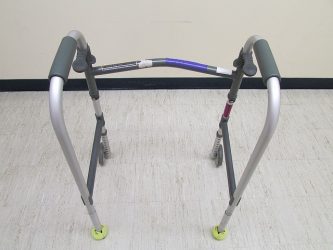Is your home walker-ready?
Mom or Dad is moving in with you shortly and they have a walker.
Or perhaps, they are aging in place and you want to help them make their home walker-ready.
In today’s post, we’ll cover the steps you can take to prepare your home or your loved one’s home to make it walker-ready.
5 home walker safety tips
But first, home walker safety tip number one!
The number one safety tip to consider when you’re getting your home ready for a walker is to ensure that you or your loved one is properly fitted for the walker.
While it may seem you can just grab any “ole” walker and make it work for you or your loved one, this is not advisable.
For a walker to be safe and supportive, it has to fit your height, weight and specific situation.
The wrong walker can lead to injuries that are caused by the walker not being rightly fitted for you.
The wrong walker can also lead to falls, which can in turn be fatal.
Consider a wider door
If your door is narrow, you might want to consider a renovation that includes widening your doorway to the allow the walker in. Of course, you will have to consider if this is absolutely necessary.
We do realize that this could mean a significant financial investment but ultimately, it will help you or your loved one come in and out of the house much easier.
Ramp for easier movement
Stairs can prove challenging for people with mobility issues.
Where possible, build a ramp that allows easier movement in and out of your home.
Bedroom downstairs or which does not involve too many stairs
This ties into the point above.
A bedroom downstairs reduces the need for you or your loved one to use the stairs – a common cause of falls.
Get rid of obstructions
Loose rugs, wires that cross the floor and any other object that is in the way can become fall hazards.
If you have a loved one in your home who uses a walker, get rid of obstructions in those spaces where they travel frequently.
Keep pathways lighted up
You or your loved one may need to go to the bathroom in the middle of the night.
In addition to keeping pathways clear of obstructions, it is helpful to have night lights.
At the very least, you or your loved on should have the ability to control lights so that pathways are lighted when there’s no daylight outside.
Need reliable home care services for you or your loved one?
Call Green Tree Home Care at 800-518-9277 to talk to a representative and find out how we can help you.










